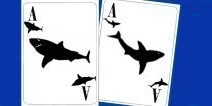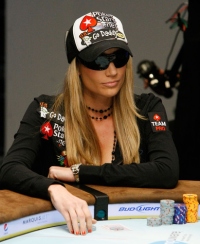|

Join our Newsletter
& get our free guide Starting Hands Revealed
We hate spam too!
We value your privacy and never share your email. All our emails have an opt-out link. Click it, and you will never hear from us again. pokerstars marketing code
in various languages
pokerstars review
in various languages
|
Thinking In Terms of Hand RangesThe way to gain an edge
So how can you learn to think in terms of ranges, intuitively and all the time? It's easy. First, you need to shed whatever traces of a single-hand-based thought process are left in your brain. Then, you need to replace the hand-based thought process with a hand range-based thought process. You'll achieve this by studying hand histories and theory off of the felt. And finally, you'll learn to combine range theory with intuition to make quick decisions at the table. Let's examine each step one-by-one. Step 1: Stop Thinking About Single HandsMany of us poker players came up watching movies like Rounders. It's pretty entertaining to see Mike McDermott guess the exact hands that his opponents are holding correctly; that's pretty heroic stuff. But it's also entirely unrealistic. The fact is that we can't ever pin opponents on a single hand with certainty, unless our opponent turns his hand face-up. Poker is a game of incomplete information. Thus we must always play a poker strategy that takes into consideration our potential to make an erroneous judgement. Simply put, we'll never be certain about a read. So we need to use probability to make educated guesses. A hand range helps us to do this. A range is just a set of possible hands, each given a probability weight, that an opponent could be holding. So in order to think in terms of ranges, you need to ignore your subconscious tendency to guess at exact hands your opponent might have in a situation. It's human nature to think in terms of absolutes; we need certainty! But to win at poker, you need to conquer this desire to pin an opponent on a specific hand. You will make better, more informed decisions by thinking in ranges instead. Step 2: Replace the Single-Hand Thought Process With A Range-Based Thought ProcessOnce you've recognized your tendency to think in absolutes, you'll want to replace that tendency as soon as possible. After all, if you don't replace bad poker habits with new ones, you're likely to fall right back into your old ways! You need to switch to a range-based state of mind. How, exactly, do you do that? Simple: practise analyzing hands in terms of ranges. Gather some of your old hand histories -- preferably some interesting spots where you've either lost money or sucked out for a win -- and analyze both yours and your opponent's play street-by-street. If an opponent raised preflop, make a chart containing the range of hands he's likely to have in that situation. If he led out in position after your check, re-evaluate his range. If he fires a 2nd barrel on the turn, re-evaluate again. Once you analyze a few hands, you'll begin to notice patterns in how people play. Preflop ranges are pretty wide, dry boards are easy to steal, calling stations' ranges tend to remain wide with each call, and so on. Once you recognize the common ranges for different situations in poker, you'll be able to make quick, accurate decisions at the table; much more quickly and accurately than you'd be able to using a hand-based approach to reading opponents. Step 3: Translate Theory to PractiseThe final step in transforming your game is putting your off-the-table work to practise in your normal game. This is probably the most fun -- and certainly the most rewarding -- part of this process. At the tables, you get to see your hard work pay off by way of cash in your poker bankroll. If you've studied enough hand histories, the application process should be almost automatic. It's all a matter of taking in your opponent's action in a particular situation and matching it up with patterns you've noticed in past hand histories. Since you've studied lots, and thus have seen lots of patterns, you'll be able to make quick and accurate decisions in real-time. That's the magic of thinking in terms of hand ranges. Now, compare this to constantly trying to guess exactly what an opponent has in every situation. That requires making lots of questionable assumptions, taking lots of time at the table, and most often results in your being totally wrong about the hand. Who needs that? Once you've learned to think in terms of hand ranges, and fully synthesized the method into your game, you'll wonder why you ever read hands any other way!
If you start thinking in term of hand ranges, it will easier for you to understand how to beat your opponents.

|











